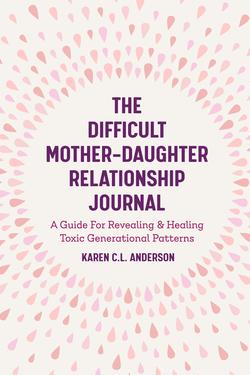Читать книгу The Difficult Mother-Daughter Relationship Journal - Karen C.L. Anderson - Страница 8
На сайте Литреса книга снята с продажи.
ОглавлениеPreface
Christmas Day, 2018
On a day that would normally be filled with busyness and family, my husband was in bed with what we thought was the flu (it wasn’t…and he’s fine) and I was zoning out on Facebook.
A message request came through from a woman who wrote, “Have you ever thought of writing a book called Great Mothers, Difficult Adult Daughters? I feel there is just far too much mother blaming and mother shaming in this world today.”
(She was reacting to the title of my previous book, Difficult Mothers, Adult Daughters: A Guide For Separation, Liberation & Inspiration.)
She had a few other choice words and an accusation: “You are preying on vulnerable adult daughters who aren’t taking responsibility for their appalling behavior to their mothers who love them unconditionally, who gave their all for their beloved daughters.”
I noticed feelings arise in me. Defensiveness, anger…fear, even. A weight on my solar plexus. I also rolled my eyes.
I took a deep breath and responded. Kindly but honestly. I expressed that my work isn’t about blame or fault for mothers or daughters. It’s about taking responsibility for oneself.
She had more accusations.
I responded with a recommendation: Dr. Joshua Coleman is an expert on family estrangement and is the author of When Parents Hurt.
“He’s okay. Not that good,” she replied.
(Which I suspect is because, like me, he asks his readers to consider looking inward and to take responsibility for themselves, and many mothers and daughters are not ready to hear or do that…I know because I used to be that daughter.)
She continued, “You have to realize that I am both a mother and a daughter.”
“Yes, I do realize that.”
She went on to say that going no-contact (estrangement) is always wrong. I disagreed.
She told me that her father had been a “complete nightmare” yet she “stuck with him.”
I shared that it was only when I took time and space away from my mother in order to better know and understand myself, that I was able to reinitiate contact from a healthier place.
She told me it was wrong of me. No matter what. I disagreed.
I asked her to tell me about her family. She asked me about mine.
She told me about her daughter who is choosing not to be in contact with her family. I told her a little bit about my relationship with my mother and the strained relationship she had with her mother.
And just like that, we became two women on two different continents sharing Christmas Day in an unlikely way.
Which isn’t to say we ended our correspondence on a happy note. She was scared, hurt, and angry. Her fear, hurt, and anger weren’t mine to address.
But I could hold space for possibility.
It was then that I knew I wanted to create guided journal for both mothers and adult daughters…for all women and anyone who identifies as a woman.
D
How many times have you said a version of one of the following phrases to yourself? “It stops with me! I won’t treat my daughter the way my mother treated me,” “My mother died, but she’s still controlling me from the grave,” “My daughter has changed. I no longer know who she is,” “I am so tired of living in reaction to my mother,” “She doesn’t respect me or my boundaries!”
You’re not alone. Studies suggest that nearly 30 percent of women have been estranged from their mothers at some point, which suggests that the number of women who struggle in their relationship with their mother or daughter (but aren’t estranged) is even higher.
It has been considered shameful and taboo to discuss the pain of dysfunctional mother-daughter issues outside of lofty clinical pathologies and personality disorders, unless it’s in a private support group where, often, the “support” keeps women stuck in painful stories, reactions, and patterns of behavior. In that paradigm, affected women are stuck conveying “lesser versions” of themselves, which, ironically, is often what happens between mothers and daughters who have a failing or dysfunctional relationship.
What was considered normal and okay in past generations (using fear, shame, authoritarianism, punishment, “should-ing,” control, binary ways of thinking, and physical violence as parenting tools, not to mention the disallowance of being able to feel and express emotion) is now known to be abusive and traumatic.
The toxic generational patterns I mention in the title of this book? Their roots run in patriarchy, misogyny, and white supremacy. This is the trauma that runs deep in our DNA. It is what was unconsciously passed down through our maternal lineages, and we now hold it in our bodies.
This is what’s at the heart of most mother-daughter conflict.
How we choose to heal individually is how we will heal collectively.
Much, much love,
Karen
